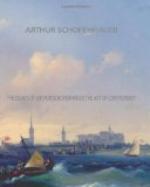This is a fact which we learn from experience; and it is clear, a priori, that one of these is a condition of illusion, and the other of knowledge.
Whether it is better to marry or not to marry is a question which in very many cases amounts to this: Are the cares of love more endurable than the anxieties of a livelihood?
* * * * *
Marriage is a trap which nature sets for us. [1]
[Footnote 1: Translator’s Note.—Also in French.]
* * * * *
Poets and philosophers who are married men incur by that very fact the suspicion that they are looking to their own welfare, and not to the interests of science and art.
* * * * *
Habit is everything. Hence to be calm and unruffled is merely to anticipate a habit; and it is a great advantage not to need to form it.
* * * * *
“Personality is the element of the greatest happiness.” Since pain and boredom are the two chief enemies of human happiness, nature has provided our personality with a protection against both. We can ward off pain, which is more often of the mind than of the body, by cheerfulness; and boredom by intelligence. But neither of these is akin to the other; nay, in any high degree they are perhaps incompatible. As Aristotle remarks, genius is allied to melancholy; and people of very cheerful disposition are only intelligent on the surface. The better, therefore, anyone is by nature armed against one of these evils, the worse, as a rule, is he armed against the other.
There is no human life that is free from pain and boredom; and it is a special favour on the part of fate if a man is chiefly exposed to the evil against which nature has armed him the better; if fate, that is, sends a great deal of pain where there is a very cheerful temper in which to bear it, and much leisure where there is much intelligence, but not vice versa. For if a man is intelligent, he feels pain doubly or trebly; and a cheerful but unintellectual temper finds solitude and unoccupied leisure altogether unendurable.
* * * * *
In the sphere of thought, absurdity and perversity remain the masters of this world, and their dominion is suspended only for brief periods. Nor is it otherwise in art; for there genuine work, seldom found and still more seldom appreciated, is again and again driven out by dullness, insipidity, and affectation.
It is just the same in the sphere of action. Most men, says Bias, are bad. Virtue is a stranger in this world; and boundless egoism, cunning and malice, are always the order of the day. It is wrong to deceive the young on this point, for it will only make them feel later on that their teachers were the first to deceive them. If the object is to render the pupil a better man by telling him that others are excellent, it fails; and it would be more to the purpose to say: Most men are bad, it is for you to be better. In this way he would, at least, be sent out into the world armed with a shrewd foresight, instead of having to be convinced by bitter experience that his teachers were wrong.




